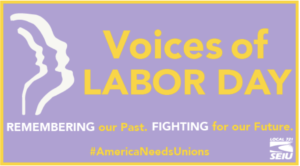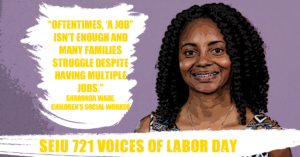
By Sharonda Wade
Some kids have imaginary friends to keep them company in their childhood years.
My constant companion was hunger.
Growing up in South Central Los Angeles, my mom, sister and I were poor. Not just “couldn’t afford the latest fashions” or “only ate peanut butter sandwiches” poor but “today we’re gonna walk to the beach and beg” poor.
We’d go up to people and ask for food, collecting half a sandwich here, a few french fries there, until we cobbled enough of a meal for the three of us to appease our growling bellies.
I was only 7 or 8 and would hang behind as long as I could, held back by the weight of utter shame and humiliation. In contrast, my sister, 5 years younger and still innocently blissful, gleefully bounded up to strangers whose hearts were softened by her cuteness and whose pity drove them to part with spare change or a piece of their lunch. For us, LA was hardly the “city of hope and opportunity” that then Mayor Tom Bradley spoke of.
Thankfully, those days are a distant memory for me but I’m constantly reminded that hunger and homelessness, which go hand-in-hand, are still very much a reality for many in our county.
The January 2017 count by the Los Angeles Homeless Services Authority found 11,000 more people on the streets than in 2016. That brings the number of homeless in LA County to 58,790.
That’s a 23 percent jump, but I didn’t need a report to tell me our homeless crisis is getting worse; I see it every day in my job as a Supervising Children’s Social Worker for the City of Los Angeles.
It’s easy to blankly look past our homeless population and deem them lazy, crazy or both – to wave the “not in my backyard” banner and gripe about how they should “just get a job.”
But what I see in so many of the families I serve is that merely having “a job” is not enough and THAT is the real problem. So many of them have multiple jobs and still struggle to stay afloat. Their lives are a giant game of Jenga; just the slightest mishap causes everything to collapse and the game ends with them losing their homes and eventually their children.
We can’t truly attempt to tackle social problems like homelessness without talking about the labor movement, the fight for worker’s rights and the importance of unions in helping secure contracts that provide livable wages and secure benefits.

This Labor Day, I’m reminded of the relief I felt after getting my job with the County. Covered by the Service Employees International Union Local 721, the position meant medical benefits, job security and livable wages –all game-changers for my family and a sense of comfort I’d never had at previous jobs.
A report done by the Economic Policy Institute last year shows that unions help boost the wages of all workers by establishing pay and benefit standards that many non-union firms adopt. Call it the “rising tide lifts all boats” effect. But with the share of unionized private-sector workers falling from 1 in 3 in the 1950s to about 1 in 20 today, the EPI says those positive effects are wearing off.
Unions are particularly important for black workers. A 2016 report by the Center for Economic Policy and Research showed unionized black workers were 17.4 percent more likely to have employer-provided health insurance and 18.3 percent more likely to have an employer-sponsored retirement plan than black workers who aren’t in unions.
Also, unionized black workers earned an average of 16.4 percent higher wages than non-union black workers, making an average of $24.24 per hour compared to $17.78.
That points to unions being crucial in helping to bridge the wage gaps that have persisted for years.
As a 19-year-old student at Cal State Long Beach I had three jobs, a full load of classes and no car. One of the jobs was in Universal City and the other was in DTLA, which meant hours commuting on public transportation and barely making enough at all three jobs to scrape by. Homelessness, like an insatiable wolf, was always at the door, waiting for the slightest opening to blow down the hole-ridden walls of my raggedy apartment and leave me on the street.
Thankfully with the support of a few mentors, friends and the grace of God, I survived and was eventually able to get a job downtown where I was making slightly more than all the others combined.
Sadly my story isn’t unique and the threat of homelessness was very real. An increase in rent, unexpected medical bill or sudden illness could be all it takes to flip your life around. How many of us are just one or two paychecks away from the pavement? Without a union to support and prevent a worker from being fired unjustly, it’s hard to truly feel secure. In order to reverse the growth of homelessness in our communities, we need to also reverse the decline of union jobs and membership in our country.
Anti-labor pundits like to paint public workers as “greedy” and “selfish” (mind you they usually say this while raking in their six-figure salaries and floating into retirement on golden parachutes). But public servants do just that: we work hard in serving the public, we pay taxes, and we shouldn’t have to ask for handouts or be denied basic protections at our jobs.
I’m grateful for my work now and the difference I get to make in the lives of the families I assist. I’m grateful to be a part of SEIU 721, where I serve on the Executive Board and help ensure public servants get the wages, safe workplaces and benefits they deserve.
And most of all, I’m grateful that when my husband and I tuck our 6-year-old son into bed, we can rest assured that the only big bad wolf he has to be worried about is the one in the storybook and not one that’s trying to blow our house down.
Sharonda Wade is a Supervising Children’s Social Worker for Los Angeles County, reviewing foster homes to make sure they are safe before children are placed there. She has worked for LA County for 8 years and also serves on the Executive Board of SEIU Local 721.
RELATED VIDEO:
___
This concludes our “Voices of Labor Day” series. We hope you have enjoyed reading these accounts from your fellow SEIU 721 members as we stand in unity and remind everyone that #AmericaNeedsUnions!
 Share
Share
 Share
Share